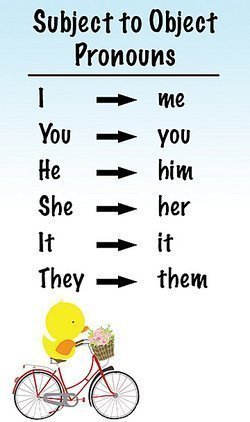Object Pronouns mean article of pronouns. Object pronouns replace the noun which is in case of object in the sentence.

They are used as the object of the verb in the sentence. If there are two objects in the sentence, ‘object pronoun’ is used as in below example sentences.
- I bought her a birthday present.
- I bought a birthday present for her.
When many of ‘phrasal verbs’ are used with a object together, the object can be used both in the form of ‘verb+noun+preposition’ and in the form of ‘verb+preposition+noun’ .
- You can take your jacket off if you like.
- You can take off your jacket if you like.
After the usages of “as” and “than”, object pronouns are used in “informal” language.
- My sister is nearly as tall as me.
- I can run faster than him.
Subject pronouns are used in a “formal” language and auxiliary verb is used after these.
- My brother is as handsome as I am.
After the usage of “but” (meaning of except), object pronouns are always used. The usage of subject pronouns is possible in more “formal” language before a verb.
- Nobody but her would do such a crazy thing. (More formal: Nobody but she …)
We use object pronouns after the usage of except (for).
- Everybody agreed except (for) me. (NOT … except I)
When relative clause is used after “it is …” or “it was…”, there are two possibilities:
a) object pronoun + that (informal)
FOR EXAMPLE 😀- It was him that rescued the kids.
b) subject pronoun + who (formal)
FOR EXAMPLE 😀- It is I who need your advice.
- It was he who rescued the kids.
We can give the same meaning by using a different usage so as to avoid being more formal or more informal.
- He was the person/ the one who rescued the kids.
A pronoun may sometimes be the subject of the usage of “infinitive-to” and clause, also may be the object of a verb or preposition. In such cases, object pronouns normally are used.
- It is for her to decide (NOT It is for she to decide).
The personal pronouns after the ‘prepositions’ in the descriptive structures made with the words “have” and “with” can be removed from the sentence.
- She was carrying a bag with thousands of dollars in (it).
If the object of infinitive-to‘ usage is just mentioned, object pronouns are not used at infinitive clauses.
- The cake was too beautiful to eat. (NOT …too beautiful to eat it)
Essential points and clues about Object Pronouns…
Instead of nouns or noun groups which are in case of object in the sentence:
FOR EXAMPLE 😀- I saw Felicia crying yesterday but I didn’t ask her the reason.
- The girls in the school basketball team played very well and the coach thanked them for their great effort.
- Everything was arranged for the summit but the chairman postponed it to the following week.
When you want to use pronoun after prepositions:
FOR EXAMPLE 😀- Caroline is my best friend so please don’t talk behind her, at least when you are with me.
At structures of comparative that adjectives and adverbs are used:
FOR EXAMPLE 😀- I don’t speak English as fluently as him because he has been to Britain several times.
- The neighbours next door are a lot noisier than us as they have got three little children.
When ‘subject pronoun’ is used for the side made comparative, auxiliary verb must be used in pursuit of this.
- My brother is more stubborn than I am.
- The Jenkins bought a bigger house than we did.
When it is used independently, not be in a sentence:
FOR EXAMPLE 😀- Alp: I didn’t like the film much.
Beril: Me, neither.
- Nilly: Who was shouting in the room yesterday?
Bruce: Him, not us.
If ‘subject pronoun’ is used in these usages, then auxiliary verb must be used.
- Who has left the room in such a mess?
I haven’t. She has.
When ‘it’ pronoun is used as ‘object pronoun’, it may be used in pursuit of verbs such as ‘love’, ‘hate’ that express emotion:
FOR EXAMPLE 😀- My father likes it that our family comes together on special occasions.
- Ahmet hates it when somebody criticizes his ambition in business.
In the usage “find / make / think… + it + adjective”:
FOR EXAMPLE 😀- When Evelyn went to Toronto for the first time, she found it hard to adapt to the city life.
Even if pronoun is in subjective (subject) case at situations which are expressed by being used “of”, ‘object pronoun’ must be used.
- Only two of us left the hall earlier because the concert was quite boring.
- Sam sent her CV to several companies but only one of them called her for an interview.
 Learn English Fondly Learn English Fondly,Easily,Quickly
Learn English Fondly Learn English Fondly,Easily,Quickly

no